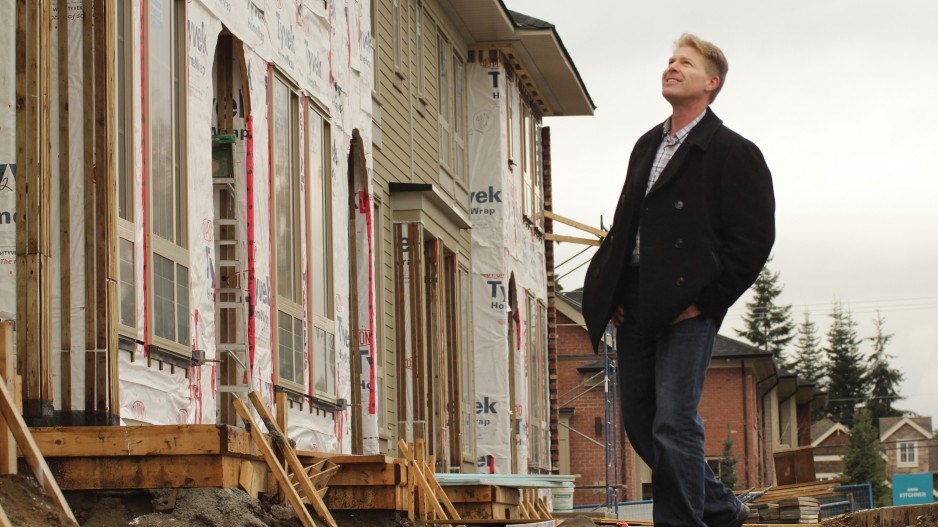The Lower Mainland is in serious need of more licensed strata managers – but persuading people to take up the job isn’t easy, say industry insiders.
Scott Ponuick, president and senior strata agent for Surrey-based Peninsula Strata Management Ltd., said the Lower Mainland alone could use “a couple hundred more agents” to help out an overworked industry. Ponuick, whose company recently won a Surrey Board of Trade award for companies with one to 10 employees, said there’s a need for both residential and commercial strata managers.
There are 1,291 people licensed to provide strata management services in B.C., according to the Real Estate Council of British Columbia. Of those, 395 are in the county of Westminster, which includes Surrey, Abbotsford, Chilliwack and the surrounding communities.
“We as an industry are extremely short on people as a whole – qualified people,” he said. “And there’s obviously a difference between people and qualified people. I’m sure we could get 100 people to run out and take the course at [the University of British Columbia’s] Sauder School of Business, but it doesn’t come with the experience.”
Ponuick, a strata manager since 1998, has about 60 buildings under supervision by Peninsula Strata Management. He noted that accreditation rules came into effect in 2006 under the Real Estate Services Act, requiring agents to take the Strata Management Licensing Course, which takes about six months and is offered through Sauder School of Business’s real estate division. Applicants must achieve a minimum grade of 70% on the exam to pass.
Peninsula Strata Management, which has handled residential, commercial and industrial strata management since 2012, is one of many companies struggling with a shortage of qualified talent, Ponuick said.
The sector is intensely competitive over labour, with strata managers getting poached from other competitors, or headhunters luring them away with enticing offers.
He estimated that of the 1,291 licensed strata managers in the province, not all are actually working in the field and some have retired but still have licences.
“We’re having to cherrypick from one another,” he said. “If I hire somebody, that person might have left another company, which leaves a hole there.”
Ponuick said on top of this is a seemingly endless supply of new multi-family residential units and commercial space coming onto the market.
“It is causing a lot of stress on our industry I would say, because we’re just trying to meet the demand,” he said. “And when new stuff comes on, there’s just no one to take it. The Lower Mainland is going through an unprecedented real estate boom and it hasn’t gone through a normal cycle. It’s just continued to go up and demand has followed it.”
Ponuick said the new accreditation has helped further “legitimize” the business, but added it pushed out many managers who were either close to retirement, or didn’t want to go through the hassle and financial implications of taking the exam through UBC. He said a job fair or push from the provincial government might help bring new people into the industry, but noted one upside for strata managers at the moment: “I would never be out of work unless it was by my own choice.”
Tony Gioventu, executive director of the Condominium Home Owners Association of BC, said the problem is not just a lack of qualified managers in the sector, but also that managers are overworked and underpaid.
“They burn out and nobody wants to be in the industry,” Gioventu said. “And they’re leaving the industry because of it. The brokerages themselves are not compensating them enough, or giving them enough support so that they can do their jobs reasonably.”
He said everyone ends up suffering.
“On the other side the strata corporations are very frustrated because they don’t get the kinds of services that they want, and the response that they want. And they don’t get it because the managers are so overworked.”
Gioventu agreed with Ponuick’s assessment of the shortage, saying at least 250 positions need to be filled.
He said the “sweet spot” for a strata manager is about 500 units, but most take on much more than that to make a living. Gioventu said the Strata Property Agents of British Columbia (SPABC) and the Professional Association of Managing Agents need to make sure strata managers are better compensated and not taken advantage of by brokers, but he’s not optimistic change is on the immediate horizon.
“SPABC is all the brokers, the owners of all the companies,” he added. “So the last thing they want to do is pay their managers more money because it reduces their profit. So nobody wants to talk about this.”
SPABC executive director Nizam Dossa said in an email response to Business in Vancouver that the organization is reaching out to post-secondary institutions for new strata managers and is also courting those looking at “second career” opportunities.
“Currently, there is movement from brokerage to brokerage by strata agents as higher salary demands are being met for those qualified,” continued Dossa. “As such, SPABC is big on education and expanding the eligible pool of managers entering and staying in the industry. Fees charged to the client will therefore have to reflect that.”




